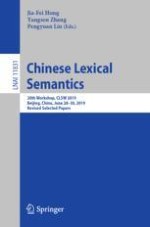2020 | OriginalPaper | Buchkapitel
A Comparative Study of the Collocations in Legislative Chinese and General Chinese
verfasst von : Shan Wang, Jiuhan Yin
Erschienen in: Chinese Lexical Semantics
Aktivieren Sie unsere intelligente Suche, um passende Fachinhalte oder Patente zu finden.
Wählen Sie Textabschnitte aus um mit Künstlicher Intelligenz passenden Patente zu finden. powered by
Markieren Sie Textabschnitte, um KI-gestützt weitere passende Inhalte zu finden. powered by
